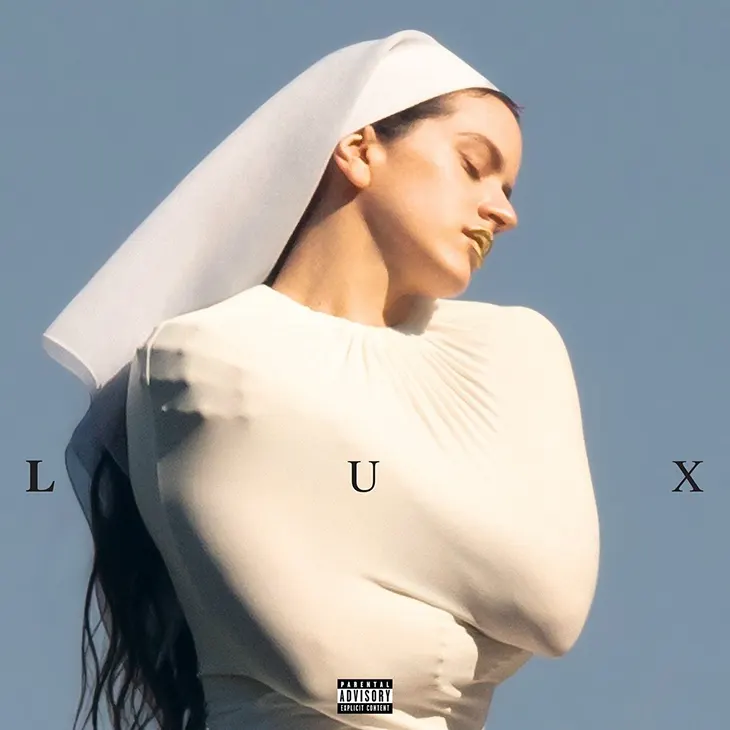
I didn’t wait for the perfect setting to hear Rosalia’s LUX. I started it at the gym, not in a cathedral of deep listening but between the clank of weights and an elliptical machine someone refused to wipe down. Then I let it follow me through the street, into the office, into a screen already full of demands. It didn’t feel wrong to hear it this way. If anything, it made the album’s scale clearer: LUX is not a record waiting for stillness. It arrives while life is already in motion, and still insists on being more than background. Its intensity builds its own room, even when you’re not in one.
DORIC ORDER
Some albums make themselves compatible with daily life, background-friendly, emotionally legible, built to score familiar moods. LUX interrupts that logic. The more I move through it, the more I feel the friction between what music is expected to be right now, fast, quotable, loopable, clipped down for TikTok, and what Rosalía has made instead, a record built from movements, strings, and voices that do not flatten themselves into one language, one sonic idea, one emotional entry point. It is not difficult for the sake of difficulty. It is difficult because it refuses to translate itself into quick understanding. That alone feels radical today, when pop is increasingly designed for speed instead of depth.

That was when I thought of Anna Dorn’s forthcoming novel American Spirits. I read an early copy for review, and its story, a pop star releasing an album that confuses her listeners instead of satisfying them, attached itself to LUX almost immediately. In the book, the music isn’t weaker, just less obedient to the audience’s expectations, and the reaction shifts from admiration to irritation. Dorn imagines the backlash before it happens, the way artistic evolution is reframed as failure the moment it stops being easily consumed. I couldn’t ignore the parallel. When a woman changes the terms of her work, people don’t call it growth. They call it a problem to be fixed.
I saw that dynamic unfold in real time with LUX. Before full reviews or think-pieces or quote-tweet dissections, the first wave of public response arrived through Instagram Stories. People I know posting “Berghain is unbearable” while others looped it obsessively and said they had waited years for Rosalía to sound like this. The divide did not feel like taste. It felt like tempo. Social media rewards the fastest reaction, not the truest one. The easiest thing to dislike online is whatever does not offer immediate footing. LUX asks the listener to adjust their pace. That alone is enough to make it polarizing.
Pop is built for speed. LUX asks for patience, and that alone makes it controversial.
The multilingual writing amplifies that refusal of instant access. Fourteen languages across a single album do not function as a global flex. They redistribute power inside the listening experience. Rosalía shifts the burden of comprehension away from herself and onto us. The lack of linguistic uniformity forces attention to tone, breath, phrasing, emotional contour, not only to words. That feels subversive inside pop, a genre that is expected to be universally singable even when content is complex. LUX builds meaning through sound long before meaning arrives through vocabulary. Some listeners will meet that with curiosity. Others will meet it with impatience. The album accepts both outcomes.
The breakup thread works the same way. The engagement that ended, the tattoo that outlived the romance, the wedding that will not happen, none of it appears as spectacle. Rosalía does not script the collapse of a relationship into a three-act arc of devastation, reflection, restoration. The pain moves through the record the way memory moves through consciousness, uninvited, unsummarized, unpolished. Pop still tends to treat heartbreak as a central thesis. In LUX it becomes one event among many, not the defining story but one story.
View this post on Instagram
The orchestral architecture reinforces that sense of reorganization. The strings do more than decorate the songs, they create tension, mark emotional shifts, and decide the pace of each section. Instead of pop tracks with classical touches, the album behaves like a single composed work that happens to exist inside the pop system. That creates a clash with the way music is expected to function now. Streaming logic favors songs that can be lifted out and replayed in isolation. LUX refuses that. Pull one part out and the rest loses its balance. The music insists on being heard as a whole, and that insistence is a choice, not a weakness.
This is where the word “pretentious” begins to hover, but I am less interested in defending the album than in asking what that word tries to police. It often gets used when art expects patience or thought instead of instant feeling. When the listener is not centered as the one being served. When comprehension is not automatic. The accusation says less about the work and more about the discomfort of encountering something that does not flatten itself for you.
Streaming culture wants songs that can live alone. LUX collapses when treated that way, and that collapse is intentional.
What keeps returning to me is how rare it is to hear a pop album that lets uncertainty stay in the room. LUX avoids emotional shortcuts, refuses the neatness of confession-as-closure, and treating explanation as a requirement for meaning. The restraint is almost more surprising than the operatic scale or the multilingual passages, because it lets complexity exist without softening it. The album moves with the confidence of something that doesn’t need to simplify itself to be understood later.
I still can’t tell which tracks will stay with me, which lyric will surface first, or which languages I’ll eventually memorize instead of just feeling inside the melody. The album gives space for that uncertainty. Nothing needs to be decoded before it has value. LUX moves at its own pace, and the longer it’s allowed to linger, the more it reshapes the listener instead of rushing to be understood.
Maybe that is the real provocation of LUX. Not the orchestra. Not the languages. Not the breakup fragments. The refusal to collapse into one meaning. The refusal to make itself easier than it is. Some records want to be met instantly. This one waits. It stays alive longer than the reaction built around it. It asks the listener to return without promising reward.
LUX was made to last longer than the first reaction it receives.
And maybe that is what most people have forgotten how to like.





















sorry but can;t stand rosalia this is so pretentious